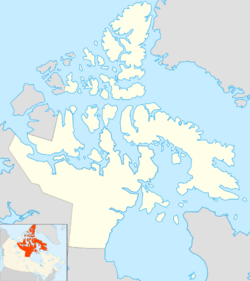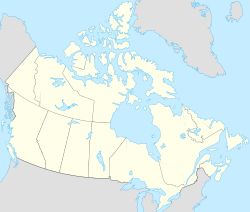Findlay Group facts for kids
| Geography | |
|---|---|
| Location | Arctic Ocean |
| Coordinates | 77°24′N 104°46′W / 77.400°N 104.767°W |
| Archipelago | Queen Elizabeth Islands Canadian Arctic Archipelago |
| Total islands | 5 |
| Major islands | Lougheed Island |
| Area | 1,409 km2 (544 sq mi) |
| Coastline | 278 km (172.7 mi) |
| Administration | |
|
Canada
|
|
| Nunavut | Nunavut |
| Region | Qikiqtaaluk |
| Demographics | |
| Population | Uninhabited |
The Findlay Group is a collection of five islands located far north in the Canadian Arctic Archipelago. Imagine a super cold, icy part of the world – that's where you'll find them! These islands are part of Nunavut, Canada's largest and northernmost territory. They sit in the vast Arctic Ocean.
The main island in this group is Lougheed Island. The other islands are Stupart Island, Edmund Walker Island, Grosvenor Island, and Patterson Island.
Contents
Discovering the Findlay Group
The Findlay Group islands are found in the Arctic Ocean, which is the smallest and shallowest of the world's five major oceans. These islands are part of a larger group called the Queen Elizabeth Islands. They are also part of the Canadian Arctic Archipelago, a huge group of islands in northern Canada.
Where are these islands?
The Findlay Group is located in the Qikiqtaaluk Region of Nunavut. This region covers a massive area, mostly made up of islands in the Arctic. The islands are very remote, meaning they are far away from most towns and cities.
What islands are in the group?
The Findlay Group is made up of five islands. The biggest one is Lougheed Island. It's the most well-known island in the group. The other four islands are smaller:
All these islands are uninhabited, which means no people live there permanently. This is common for many islands in the far Arctic due to the extremely cold weather and harsh conditions.
How big are the Findlay Group islands?
Together, the Findlay Group islands cover an area of about 1,409 square kilometers (about 544 square miles). To give you an idea, that's roughly the size of a large city, but spread out over several islands in a very remote area. The coastline of these islands stretches for about 278 kilometers (173 miles).
Life in the Arctic
Even though no people live on the Findlay Group islands, the Arctic environment is home to many amazing animals. Animals like polar bears, seals, and various types of birds are adapted to survive in the cold, icy conditions. The islands themselves are often covered in ice and snow for much of the year.
The Arctic region is very important for understanding our planet's climate. Scientists often study areas like the Findlay Group to learn more about ice, oceans, and how they are changing.



